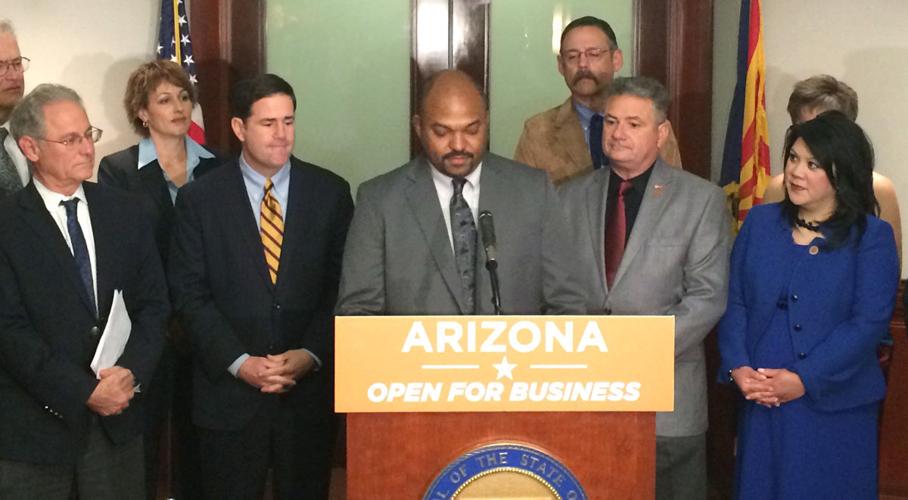Gov. Doug Ducey made a big deal of announcing new jobs for Tucson May 21, calling this new private investment a “huge economic win for Arizona.”
But when it turned out to be a new Comcast call center, a lot of people in Tucson were underwhelmed.
Among sighs and groans, many of us said, essentially: “In 2015, in Tucson, are we still landing call centers and calling that economic development?”
It’s more than an academic question: In exchange for putting the 1,000-employee center here, Comcast is asking for incentives from the city of Tucson that amount to up to a $180,000 give-back. The City Council is to consider the deal Tuesday.
But in any case, the answer to the question is yes: In today’s Tucson, a big, new, cutting-edge call center with social-media and Spanish-language responsibilities is a solid win for our economy. That’s partly a statement on our struggling economy and partly a reflection of our mediocre workforce. It’s also because this seems to be a pretty good Comcast operation.
Tucson began attracting call-center operations in the 1980s, and they boomed here through the 1990s and into the last decade, to the point where at times they employed about 5 percent of the area’s workforce. AOL, Afni, Convergys and Geico all have been major players over the years. Five of the top 37 employers in this year’s Star 200 list of the area’s largest employers are call-center operations.
As plentiful as the centers became, the industry also has been notorious for low wages, sweat-shop conditions and high turnover. At too many centers, every second of a worker’s day was monitored, each call loaded with requirements to “upsell” customers, even those who called in angry. Bathroom breaks were rationed.
But the thing is, the more of those jobs we got, the more competition there was among the call centers and the better the chances of higher wages, good benefits and promotions. So if one call center was especially overbearing in its treatment of workers, those workers could take their experience and go somewhere else.
For people with a high school degree and a little college, these could be good jobs, or, at the very least, air-conditioned work that pays the bills.
Then the Great Recession hit. By 2011, the Census Bureau ranked Tucson the sixth-poorest metro area in the country, as measured by poverty rates. We lost about 34,000 jobs — about 9 percent of total jobs — and our unemployment rate hit 10 percent. Everything fell apart.
Now the local economy has slowly turned toward the positive, but we still urgently need to attract more jobs and boost wages. Here’s how George Hammond, an economist at the UA’s Eller College of Management, explained the situation on June 3 during a mid-year economic update:
“What does matter for the state, and it matters for Tucson as well, is overall slack in the labor market. There’s a lot more slack in the labor market than there was before the Great Recession. We won’t see that overall wage growth pick up until we see that slack reduced.”
The equation is simple: The more employers must compete for employees, the better pay and benefits they’ll offer.
In Tucson, that means we need jobs for a lot of high school graduates without college degrees. Residents under age 45 here have a lower rate of college graduation than the country as a whole. And it’s getting worse, as Dorothee Harmon, a Pima County program manager who specializes in employment and training, explained.
“Our rate of educational attainment is falling,” she said.
Harmon noted that older Tucson residents are more likely to be college-educated than the national average, whereas for younger residents the opposite is true. And the younger Tucsonans are, the worse educated they are compared to the national average.
Judy Wood, who founded the local ContactOne call center in 1981, told me her operation offers good job for students, for mothers and for others, as well as some career opportunities.
“Obviously, Tucson needs industries that have higher-paying, professional-type jobs to help grow our economy,” Wood said. “But like restaurants and a lot of other entry-level employers, this gives, say, a high school graduate, or someone who hasn’t graduated from high school who has the skills, an opportunity to get into the workforce and develop those computer skills and communications skills.”
And the Comcast center will not be a low-end call-center employer. An online search of Comcast jobs open in Tucson shows a need for “social media specialists” who must be fully bilingual in both written and spoken Spanish and English, and must have a bachelor’s degree.
A memo from city manager Martha Durkin says customer-service representatives and computer specialists will earn an average of $33,900 a year.
Mayor Jonathan Rothschild pointed out the bottom line, that Comcast is offering “a $34.8 million payroll here in the next couple of years, hopefully forever. That’s essentially $34 million of new money here in our economy.”
So, yes, Comcast’s new operation here is just a call center, though a souped-up one. But Tucson absolutely needs this and more such recruitments if it’s going to absorb its underemployed workforce and start to drive wages up and poverty down.





